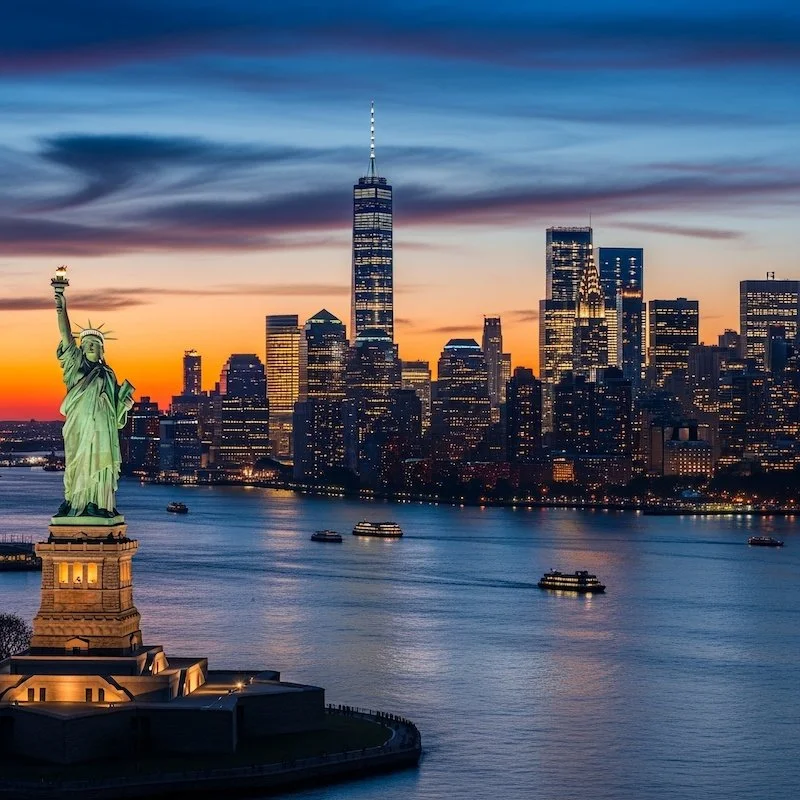Zohran Mamdani’s Affordable New York City Vision
MAGA, Wall Street and even some centrist Democrats are in anguish over the prospect of a 33-year-old New York assemblyman by the name of Zohran Mamdani becoming mayor of New York City.
Trump has threatened to strip Mamdani of his naturalized citizenship. Some of the richest people in New York, real estate moguls, fund managers, even Jamie Dimon, CEO of JPMorganChase, have pledged to raise $20 million to defeat Mamdani in the November 4 general election.
Why Zohran Mamdani’s Affordable NYC Platform Scares the Establishment
Why the panic? Mamdani is a Democratic Socialist who proposes that the city create and manage a half dozen grocery stores in poorer neighborhoods where they don’t exist. He also wants to make all bus service free. He’s also suspect on support for Israel in a city long dominated by Jewish voters. And the panic button for the real estate moguls is that Mamdani wants to freeze rent payments for five years, saving renters more than $6 billion.
Essentially, Mamdani is running on a “make New York City affordable” platform, issues so potent for NY voters that he routed former Andrew Cuomo in the Democratic Party primary. Now, Cuomo is back for a rematch. The results have implications not just for New York’s political future, but for the 2026 congressional races nationwide.
Why? Because the political energy on the left is contesting a Democratic Party mainstream that in recent years has been less confrontational. Mamdani swept to victory on the backs of enthusiastic young and ethnic voters, groups that have been drifting away from Democratic candidates.
In a future newsletter I’ll discuss the rent control issue. For now, let’s talk about those grocery stores and free buses that Trump calls “Communist,” and Dimon calls “Marxist.”
Are Publicly Run Grocery Stores Really Radical?
Are those ideas foreign to America? Not at all.
Seventeen states own and operate their liquor trade, some at the wholesale level, some right down to the retail stores. Here they are: https://bottlepos.com/blog/alcohol-control-states .
Forty-seven states are monopolies running state lotteries. https://www.statista.com/statistics/388238/sales-of-lotteries-by-state-us/
North Dakota has a state-run bank and operates the largest flour mill in the U.S., managing trade and pricing to protect consumers and farmers. .https://www.ndmill.com/
Opponents of municipal grocery stores argue that grocery chain profits are an industry average of 1 to 3%. How could small mom and pop type of city run stores keep from losing money when some of the best pros in a multi-billion-dollar industry with huge pricing power barely squeak by?
Well, looked at it another way, if five years ago you bought stock in Albertsons when it was priced at $13 a share, you would have made a tidy 46% profit selling your shares this week for $19. Or even better, if five years ago you bought Publix, another top ten grocery chain, for $11, you would have nearly doubled your investment selling this week for $21. Publix, by the way, is an employe-owned company.
Like most businesses, some are managed better than others. Krogers’ share price has remained flat for the last five years. Some good managers are making a ton of money on those paper thin 1 to 3% profits. Some aren’t.
Free Bus Service: A Proven Model in U.S. Cities
Now, when it comes to free bus service, another of Mamdani’s plans for New York City that seems to have his opponents aghast, five minutes of research turns up 40 major U.S. cities with some form of it. finance.yahoo.com/news https /goodbye-transportation-budget-more-40-130000363.html
Here’s what Mamdani isn’t proposing: strong arming city business, mafioso style, for a piece of their action, like Trump is doing to Intel and other major U.S. companies. Nor is he demanding businesses cut their profits and swallow their added costs generated by Trump’s bizarre tariff policy.
U.S. history is replete with examples of how the public through its government entities have successfully owned, operated and managed businesses and industries considered at the time better handled by the public itself: public power, water, airports, home mortgages, veterans’ benefits. And so on.
Private business apparently is unable or unwilling to provide grocery sales in some less affluent parts of New York City. What’s unusual about filling that need through city intervention.
Bus transportation is essential to public and private services in most cities, especially to poorer residents. Most states already consider free transportation a legitimate role for government.
New York voters may have other reasons for not supporting Mamdani. That’s their business. I don’t live and vote there. But those grocery stores and buses shouldn’t be part of that decision.
Oh, one more thing. The people of Green Bay, Wisconsin own the Green Bay Packers football team as shareholders in a non-profit corporation. https://www.packers.com/community/shareholders. . Public ownership hasn’t proved a problem there, since the Packers have appeared in more playoffs than any other team in National Football League history.
Here’s this week’s STEM Winder: A weekly look into the future.
Comments? Criticism? Contact Joe Rothstein at jrothstein@rothstein.net
Always Get It’s Always Something
Sign up to get the most recent column set to your inbox for free.




What happens when a fun-loving, charismatic, reform-minded Mexican-American billionairess becomes president of the United States and strikes fear in the pocketbooks of a cabal of the rich and powerful?